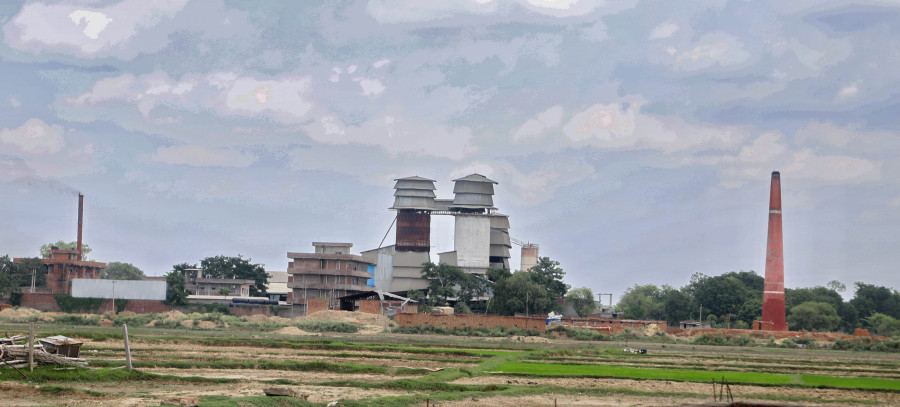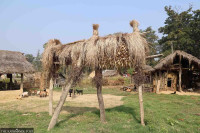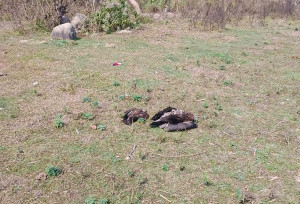Lumbini Province
Lumbini area affected by the pollutants and chemicals emitted by large-scale industries operated on the other side of the border
The pollution from 40 industries being operated on the Nepali area, in addition to the pollution making its way in from India, is causing irreversible damage to the population living in the area
Ghanashyam Gautam
After the Supreme Court ordered a ban on new factories in the Lumbini area on Sunday, locals living near Lumbini, said that the area is choking in pollution not only because of Nepali industries operating in the area but also from the large industries across the border.
In March, a writ petition was filed at the Supreme Court demanding the conservation of the Lumbini area. Conservationists and legal advocates had lodged the writ at the apex court, arguing that the rampant registration of private industries could potentially have a serious impact on the conservation of the historic and archaeological site.
Locals said that Indian industries operating across the border lie only around 15km away from Lumbini. According to them, the birth place of Lord Buddha, which is also a UNESCO world heritage site, is facing major pollution threats from large-scale industries based in Siddharthanagar in India. Siddharthanagar is around 8km from central Lumbini.
There are numerous brick kilns, rice mills, liquor industries and drugs pharmaceutical industries in Kakrahwa, Mahale and Fariniya in Siddharthanagar, locals say. Smoke, dust and chemical pollutants emitted from those industries have adverse effects on the archeological sites of Lumbini, they say.
Four years ago, a team from the Central Department of Environmental Science had conducted a study on the effects of pollution in Lumbini area. The team was led by Ram Prasad Regmi, a professor at Central Department of Physics, Tribhuvan University.
The study showed that the main cause of pollution in the area was due to smoke emitted by industries, fire wood and burning foliage and vehicles. Om Prakash Yadav, a civil society leader of Marchawar area, said that the pollutants and smoke emitted from Indian industries reach up to Butwal from Lumbini and Bhairahawa. He adds, “Smoke emitted from more than 10 brick kilns covers the whole sky on some days.”
Yubaraj Kandel, an environment researcher, said that one can’t even walk for 10 minutes in Fariniya bazaar and its vicinity without wearing masks. “Farmers also excessively use pesticides in the fields, and these chemical pollutants also have affected the Lumbini area,” said Kandel.
“During the course of the study, we found that the pollution and chemicals emitted from the Indian territory spread towards the hilly areas too,” said Regmi, adding that the effect of pollutants was also seen in Tansen.
Archeologists said that priceless archaeological sites such as Ashoka Pillar, and statues, among other artifacts stand to face corrosion by excessive pollution. They have raised concerns that the pollutants and smoke emitted from the nearby industries will have a negative impact on the habitat and the life of endangered species while also affecting the agricultural output and biodiversity.
The pollution emitted from 40 industries being operated on the Nepali area, in addition to the pollution making its way in from India, is causing irreversible damage to the population living in the area, showed the study. Kul Prasad Neupane, chairman of Siddharthanagar Chamber of Commerce and Industry, said that the government has only seen and studied the impact of industries inside Nepal. “The Lumbini area has been affected due to industries operated on the other side of the border too,” said Neupane, adding that the government should pay attention towards the problems caused by industries in the border areas.
Arjun Prasad Pokharel, Chief District Officer in Rupandehi, however, said that they will start a process to implement the Supreme Court’s order. “It’s the responsibility of the entire nation to conserve archeological sites,” said Pokharel. “I hope the concerned stakeholders will help the administration implement the court’s decision.”
He adds, “There’s huge investment in industries. It is not possible to shift industries or close them immediately. However, we will make efforts to conserve Lumbini.”




 9.83°C Kathmandu
9.83°C Kathmandu















